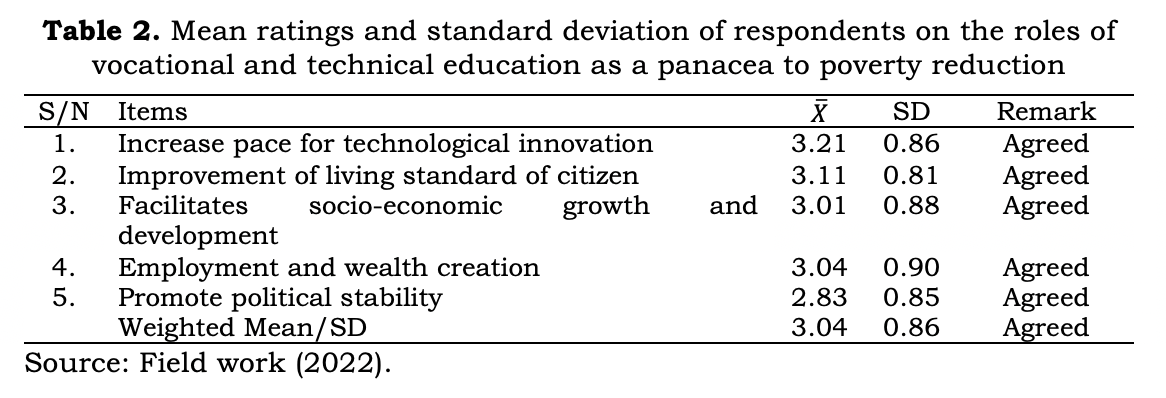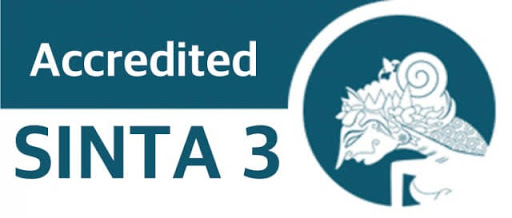Poverty reduction through vocational and technical education among graduates in Oyo State, Nigeria
DOI:
https://doi.org/10.12928/ijei.v3i1.6093Keywords:
graduates, poverty reduction, vocational and technical educationAbstract
Poverty and unemployment especially among the graduates has remained major challenges threating the economic growth and development of Nigeria. Towards poverty reduction Vocational and technical education is imperative. Therefore, this study examined poverty reduction through vocational and technical education among graduates in Oyo State, Nigeria. Four (4) research questions guided the study. The study adopted descriptive survey design. A total of 390 vocational and technical education students formed the sample size of the study out of 3,900 graduates. A structured questionnaire developed by the researchers tagged: Poverty Reduction through Vocational and Technical Education Questionnaire (PRVTEQ) validated by three (3) experts was used for the study. Split half method was used to established reliability coefficient and the overall reliability coefficient was also established at 0.87 using Cronbach Alpha. The data generated for the study were analysed using mean and standard deviation. The findings showed among others that vocational and technical education increase pace for technological innovations, improve citizens standard of living, facilitate social Economy growth and development and promote political stability. Based on the findings the researcher recommended among others, government through its agencies should map out strategies of reaching out and providing funds for individuals who are willing to set up businesses and that school management should provide more vocational centers for skills acquisition towards poverty reduction.
References
Adetayo, A. A., & Amede, L. (2021). Teachers’ Capacity Building: A Genuine Mechanism for Achieving Human Capital Development in Nigeria. International Journal of Learning and Instruction (IJLI), 3(1), 15-26.
David, W. (2017). Country’s score on its engineering index correlated to a 0.85% increase in GDP per capita. Retrieved from: https://en.unesco.org/news/workshopwomen-engineering-africa.
Kalu, V. A., Agbogo, R. A. & Okudarie, J. U. (2017). Challenges of entrepreneurship education in Nigeria. Nigerian Journal of Business Education, 4(1), 46–52.
Loo. S. (2018). Teachers and teaching in vocational and professional education. Abingdon, Oxfordshire: Routledge.
Major, J. (2016). Entrepreneurship: Concept and practice. Onisha: Cape Publishers International Limited.
Nwosu, A. N. (2017). Entrepreneurial opportunities for graduates of Polytechnics: A case study of Federal Polytechnic, Nekede, Owerri. Nigerian Journal of Business Education, 4(1), 332–338.
Oduma, C. A. (2017). Fundamentals of entrepreneurial education. Abakaliki: Citizen’s Adocated Publishers.
Okeke, O. (2013). Motivation and productivity among Nigeria Workers. Paper presented at the first National Workshop on Organizational behaviour and management. University of Ibadan.
Opate, O. (2016). Entrepreneurship: Texts and cases. Enugu: Precision printer and publishers.
Ubong, B. (2018). Entrepreneurship education in Nigeria: Issues, challenges, and strategies. Nigerian Journal of Business Education (NIGJBED), 4(1), 11-22.
UNESCO. (2021). Technical and Vocational Education and Training (TVET). Retrieved from: www.unesco.org.

Downloads
Published
How to Cite
Issue
Section
License
Copyright (c) 2022 Sarafadeen Segun Salami, Oluwatunmise Afolabi

This work is licensed under a Creative Commons Attribution-ShareAlike 4.0 International License.
Authors who publish with this journal agree to the following terms:
- Authors retain copyright with the work simultaneously licensed under a Creative Commons Attribution License that allows others to share the work with an acknowledgement of the work's authorship and initial publication in this journal.
- Authors are able to enter into separate, additional contractual arrangements for the non-exclusive distribution of the journal's published version of the work (e.g., post it to an institutional repository or publish it in a book), with an acknowledgement of its initial publication in this journal.
- Authors are permitted and encouraged to post their work online (e.g., in institutional repositories or on their website) prior to and during the submission process, as it can lead to productive exchanges, as well as earlier and greater citation of published work (See The Effect of Open Access).




